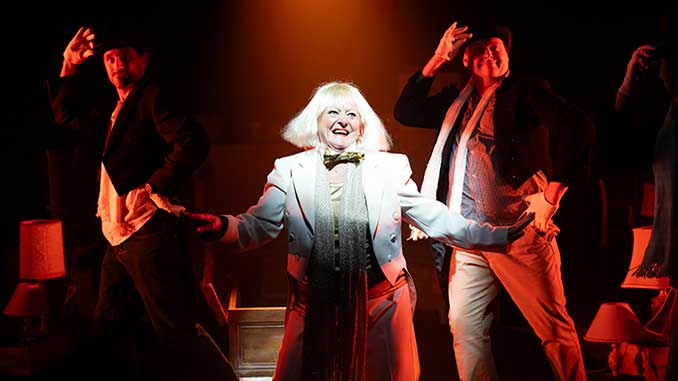 When I tell you Adam Fawcett’s Every Lovely Terrible Thing is camp, I want you to think of a lip sync at a funeral or a gay man dressed as a cowboy imparting words of wisdom during a Twitch stream. It’s camp like a meet cute underscore by Dua Lipa, or a human-sized Easter Bunny as a fluffy-tailed symbol for repressed trauma.
When I tell you Adam Fawcett’s Every Lovely Terrible Thing is camp, I want you to think of a lip sync at a funeral or a gay man dressed as a cowboy imparting words of wisdom during a Twitch stream. It’s camp like a meet cute underscore by Dua Lipa, or a human-sized Easter Bunny as a fluffy-tailed symbol for repressed trauma.
It’s 2024; throw a stick and you’ll hit someone declaring something camp. Overuse has turned it into a lazy shorthand for anything remotely queer and stylised, or a near-meaningless brand for exaggerated spectacle and a generalised commitment to aestheticism.
Fawcett’s endlessly surprising and enigmatic Every Lovely Terrible Thing is queer and stylised; it loves spectacle and reveres aesthetic (it has a human-sized Easter Bunny and a lip sync at a funeral, after all). But this two-hour dramedy breaks new ground by finding camp in an unlikely place: childhood trauma.
On the tin, the show’s an epic family drama in the vein of August Osage County or Andrew Bovell’s When the rain stops falling. It follows the Colemans, a once close-knit family in regional Victoria. They are a family haunted.
There’s Jerica (Megan Jones), the unofficial matriarch; acerbic, potty-mouthed and addicted to Milo. She’s never left her small town, and never reconciled the abuse she suffered at the hands of her now dead husband. Her estranged daughter, Britt (Sharon Davis) having left for Sydney at eighteen, returns home after years spent repressing similar memories of abuse.
Cooper (Wil King) is an unemployed twenty-three-year-old designer living with Jerica, coming into their gender queerness and out from under the thumb of their ignorant father – Jerica’s son – Charles (Lyall Brooks), and well-meaning Mother, Phoebe (Emma Choy).
There’s nothing particularly original about a play that follows a dysfunctional family, and plot-wise this show hits some familiar beats: sudden deaths, exposed lies and arguments outing long-held resentments and repressed traumas.
Fawcett’s writing has all the melodramatic trimmings of an episode of Dynasty, or, as Cooper – always quick with a queer reference – declares at one point, the charismatic dysfunction of Grey Gardens.
But just when you think you know what to expect from the show, a cowboy named Kid Coyote with a thick Southern drawl walks out on stage, points a shotgun onto a character in pearls and a silk nightie and pulls the trigger.
The show’s darkly comic dialogue and playful surrealism elevate what could easily have been a cliched affair. Think Dynasty if it were written by Tennessee Williams or a queer Sam Shepard; a kitchen-sink drama splashed with the macabre surrealist wit of iconic queer companies like Belvoir’s Sisters Grimm or Melbourne’s now-defunct Little Ones.
Macabre flourishes and weird plot points are well-supported by confident design and Justin Nott’s seamless direction. Lighting Designer Sidney Younger and Set Designer Harry Gills have often worked together, but nowhere else have their designs complemented each other so well.
Jerica’s home is a typical slice of Aussie suburbia: beaded curtains overhanging doorways, plastic sun lounges on black astro-turf, and tens of vintage lamps that surge and flicker to bring a Gothic air to moments of high drama. Meanwhile, Aron Murray casts Theatre Works’ towering back wall with intricate digital designs that signal the script’s underdeveloped flashbacks.
King delivers one of the best performances of the year as Coop, moving seamlessly from comedic beat to dramatic soliloquy with a perfect blend of confidence, charisma, fragility and magnetic physical presence. Their chemistry with tradie-turned-Twitch Streamer, Lachie (a warm-hearted Jordan Fraser-Trumble) is among the show’s highlights.
That Brooks, meanwhile, manages to remain likeable as Coop’s conservative father struggling with the pace of change around him is impressive, and his barbed repartee with Davis’s assured but tortured Britt was uproarious.
But it is unfortunate that some of the women in the cast are given short thrift. Jones is arresting as the caustic Jerica, but Fawcett doesn’t quite know what to do with her. Her relationship with Coop, so central to the show initially, is quickly shafted to make room for various other subplots. Without scenes that show us who Jerica is, her emotional climax at the end of Act One struggles to land.
Hoy, too, is afforded a rich dramatic storyline but not enough time or space to really sink her teeth into it. There is a sense that some of these character arcs were sacrificed to allow more space for King’s, who, being Fawcett’s semi-autobiographical stand-in, is often overwritten.
Still, Fawcett has created a family that feels fully formed and a world that feels wholly lived-in. ‘You can’t camp about something you don’t take seriously’, wrote Christopher Isherwood, and it’s clear that Fawcett takes the Colemans incredibly seriously.
His commitment to camp extravagance reflects an earnest desire to represent their lives using the spectacle with which they live it. Lip sync funerals and life-size rabbits are bombastic nods to a bombastic family; a way to let the high dramatic stakes of their traumas and joys spill over into equally dramatic – and often weird – sumptuous theatricality.
Every Lovely Terrible Thing is not perfect, but its technical ambition, confident design and heart make it endlessly surprising, often affecting and, dare I say it, ‘camp’.
Every Lovely Terrible Thing
Theatre Works, 14 Acland Street, St Kilda
Performance: Friday 1 March 2024
Season continues to 16 March 2024
Bookings: www.theatreworks.org.au
For more information, visit: www.labkelpie.com for details.
Image: Every Lovely Terrible Thing – photo by Pia Johnson
Review: Guy Webster
